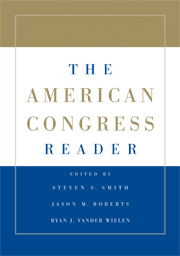Book contents
- Frontmatter
- Contents
- THE AMERICAN CONGRESS READER
- PART I THE AMERICAN CONGRESS: MODERN TRENDS
- PART II REPRESENTATION AND LAWMAKING IN CONGRESS: THE CONSTITUTIONAL AND HISTORICAL CONTEXT
- PART III CONGRESSIONAL ELECTIONS AND POLICY ALIGNMENTS
- PART IV MEMBERS, GOALS, RESOURCES, AND STRATEGIES
- 11 Senate Representation and Coalition Building in Distributive Politics
- 12 Risk-Bearing and Progressive Ambition
- 13 Issue Politics in Congress – Excerpts
- PART V PARTIES AND LEADERS
- PART VI THE STANDING COMMITTEES
- PART VII THE RULES OF THE LEGISLATIVE GAME
- PART VIII THE FLOOR AND VOTING
- PART IX CONGRESS AND THE PRESIDENT
- PART X CONGRESS AND THE COURTS
- PART XI CONGRESS, LOBBYISTS, AND INTEREST GROUPS
- PART XII CONGRESS AND BUDGET POLITICS
- PART XIII FURTHER READINGS ON CONGRESSIONAL POLITICS
- References
11 - Senate Representation and Coalition Building in Distributive Politics
Published online by Cambridge University Press: 05 June 2012
- Frontmatter
- Contents
- THE AMERICAN CONGRESS READER
- PART I THE AMERICAN CONGRESS: MODERN TRENDS
- PART II REPRESENTATION AND LAWMAKING IN CONGRESS: THE CONSTITUTIONAL AND HISTORICAL CONTEXT
- PART III CONGRESSIONAL ELECTIONS AND POLICY ALIGNMENTS
- PART IV MEMBERS, GOALS, RESOURCES, AND STRATEGIES
- 11 Senate Representation and Coalition Building in Distributive Politics
- 12 Risk-Bearing and Progressive Ambition
- 13 Issue Politics in Congress – Excerpts
- PART V PARTIES AND LEADERS
- PART VI THE STANDING COMMITTEES
- PART VII THE RULES OF THE LEGISLATIVE GAME
- PART VIII THE FLOOR AND VOTING
- PART IX CONGRESS AND THE PRESIDENT
- PART X CONGRESS AND THE COURTS
- PART XI CONGRESS, LOBBYISTS, AND INTEREST GROUPS
- PART XII CONGRESS AND BUDGET POLITICS
- PART XIII FURTHER READINGS ON CONGRESSIONAL POLITICS
- References
Summary
Lee analyzes the implications of equal representation of states in the Senate on coalition building. The considerable variation in population across states means that some states need more federal funds than others. Given that each senator's vote counts equally in the chamber, Lee argues that the inclusion of large state senators in a coalition is more costly to coalition builders than the inclusion of small state senators.
Although all states are represented equally in the Senate, they differ widely in population. At the extremes, Wyoming has a population smaller than most congressional districts, whereas California is more populous than many nations. Such differences mean that states also vary greatly in their need for federal funds. The cost of governmental programs, after all, largely depends on the number of people served by them. Despite differences in need for federal funds, however, each state has equal representational power in the Senate. This article investigates how apportionment shapes the politics of distributive policymaking in the Senate.
Apportionment shapes Senate distributive policymaking for two reasons. First, senators representing small states have more to gain from procuring a given amount of federal dollars than do senators who represent large states. A federal grant of $5 million, for example, has a far greater effect in Wyoming than in California. Such a grant yields greater electoral benefits for senators who represent small states, both in terms of their statewide visibility and the percentage of residents benefited.
- Type
- Chapter
- Information
- The American Congress Reader , pp. 141 - 151Publisher: Cambridge University PressPrint publication year: 2008



